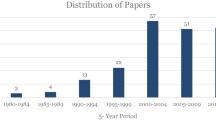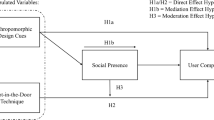Abstract
In the e-world where many of us live and work, virtual work arrangements will become increasingly commonplace. This paper reports on an exploratory study into the way in which consultants can ply their trade virtually with clients whom they never meet. US-located e-consultants provided advice to Hong Kong-located web site developers on the interface and content aspects of a website that was being developed for an international audience. Extensive analyses of the communication between the consultants and developers is undertaken, in parallel with an analysis of survey data obtained from the two sets of stakeholders. Lessons are drawn for future research and practice.
Similar content being viewed by others
References
Alavi, M., Y. Yoo, and D. R. Vogel. (1997). “Using Information Technology to Add Value to Management Education,” Academy of Management Journal 40 (6), 1310–1333.
Bazerman M. H. and M. A. Neale. (1983). “Heuristics in Negotiations: Limitations to Effective Dispute Resolution,” in M. H. Bazerman and R. J. Lewicki (eds.), Negotiating in Organizations. Beverly Hills: Sage Publications, 51–67.
Daft, R. L. and R. H. Lengel. (1986). “Organizational Information Requirements, Media Richness and Structural Design,” Management Science 32 (5), 554–571.
Daft, R. L., R. H. Lengel, and L. K. Trevino. (1987). “Message Equivocality, Media Selection and Manager Performance: Implications for Information Systems,” MIS Quarterly 11 (3), 355–368.
Davison, R. M. (2003). “Discussants and the Quality of Interaction at Conferences,” Communications of the AIS 11 (7), 128–136.
Davison, R. M. and G. J. de Vreede. (2001). “The Global Application of Collaborative Technologies,” Communications of the ACM 44 (12), 69–70.
Dubé, L. and G. Paré. (2001). “Global Virtual Teams,” Communications of the ACM 44 (12), 71–73.
Eden, C. and C. Huxham. (2001). “The Negotiation of Purpose in Multi-Organizational Collaborative Groups,” The Journal of Management Studies 38 (3), 373–391.
Evaristo, R. (2001). “Non-consensual Negotiation in Distributed Collaboration,” Communications of the ACM 44 (12), 89.
Geber, B. (1995). “Virtual Teams,” Training 32 (4), 36–42.
Goodhue, D. L. and R. L. Thompson. (1995). “Task-Technology Fit and Individual Performance,” MIS Quarterly 19 (2), 213–236.
Griffith, T. L., D. L. Tansik, and L. Benson. (2002). “Negotiating Technology Implementation: An Empirical Investigation of a Website Introduction,” Group Decision and Negotiation 11 (1), 1–22.
Hofstede, G. (2001). Culture's Consequences: Comparing Values, Behaviors, Institutions, and Organizations Across Nations. London: Sage.
Jarke, M., M. T. Jelassi, and M. F. Shakun. (1987). “MEDIATOR: Towards a Negotiation Support System,” European Journal of Operational Research 31 (3), 314–334.
Jarvenpaa, S. L., K. Knoll, and D. E. Leidner. (1998). “Is Anybody Out There? Antecedents of Trust in Global Virtual Teams,” Journal of Management Information Systems 14 (4), 29–64.
Jarvenpaa, S. L. and D. E. Leidner. (1999). “Communication and Trust in Global Virtual Teams,” Organization Science 10 (6), 791–815.
Jelassi, M. T. and A. Foroughi. (1989). “Negotiation Support Systems: An Overview of Design Issues and Existing Software,” Decision Support Systems 5 (2), 167–181.
Joinson, C. (2002). “Managing Virtual Teams,” HR Magazine 47 (6), 68–73.
Kaplan, M. F. and C. E. Miller. (1987). “Group Decision Making and Normative Versus Informational Influence Effects of Type of Issue and Assigned Decision Rule,” Journal of Personality and Social Psychology 53 (2), 306–313.
Kayworth, T. and D. E. Leidner. (2002). “Leadership Effectiveness in Global Virtual Teams,” Journal of Management Information Systems 18 (3), 7–40.
Lipnack, J. and J. Stamps. (1997). Virtual Teams - Reaching Across Space, Time and Organizations with Technology. New York: John Wiley & Sons.
Mashayekhi, V., J. M. Drake, W. T. Tsai, and J. Riedl. (1993). “Distributed, Collaborative Software Inspection,” IEEE Software 10 (5), 66–75.
Massey, A., M. Montoya-Weiss, and Y. Hung. (2003). “Because Time Matters: Temporal Coordination in Global Virtual Project Teams,” Journal of Management Information Systems 19 (4), 129–155.
Mausner, B. (1954). “The Effect of Prior Reinforcement on the Interaction of Observer Pairs,” Journal of Abnormal and Social Psychology 49, 65–68.
Maznevski, M. L. and K. M. Chudoba. (2000). “Bridging Space Over Time: Global Virtual Team Dynamics and Effectiveness,” Organization Science 11 (5), 473–492.
Moore, D. A., T. R. Kurtzberg, L. L. Thompson, and M. W. Morris. (1999). “Long and Short Routes to Success in Electronically Mediated Negotiations: Group Affiliations and Good Vibrations,” Organizational Behavior and Human Decision Processes 77 (1), 22–43.
Moscovici, S. (1980). “Toward a Theory of Conversion Behaviour,” in L. Berkowitz (ed.), Advances in Experimental Social Psychology, vol. 13, New York: Academic Press.
Mugny, G. and J. A. Perez. (1991) The Social Psychology of Minority Influence. Cambridge: Cambridge University Press.
Nemeth, C. J., M. Swedlund, and B. Kanki (1974). “Patterning of the Minority's Responses and Their Influence on the Majority,” European Journal of Social Psychology 4 (1), 53–64.
Nemeth, C. J. and J. Wachtler. (1974). “Creating the Perceptions of Consistency and Confidence: A Necessary Condition for Minority Influence,” Sociometry 37 (4), 529–540.
Nemeth, C. J. and J. Wachtler. (1983). “Creative Problem Solving as a Result of Majority vs. Minority Influence,” European Journal of Social Psychology 13 (1), 45–55.
Nemeth, C. J. (1986). “Differential Contributions of Majority and Minority Influence,” Psychological Review 93 (1), 23–32.
Nohria, N. and R. Eccles. (1992). “Face-to-Face: Making Network Organizations Work,” in N. Nohria and R. G. Eccles (eds.), Networks and Organizations. Boston, MA: Harvard Business School Press, 288–308.
Nunamaker, J. F., R. O. Briggs, D. D. Mittleman, D. R. Vogel, and P. A. Balthazard. (1997). “Lessons from a Dozen Years of Group Support Systems Research: A Discussion of Lab and Field Findings,” Journal of Management Information Systems 13 (3), 163–207.
Peterson, E. and L. Thompson, (1997). “Negotiation Teamwork: The Impact of Information Distribution and Accountability on Performance Depends on the Relationship among Team Members,” Organizational Behavior and Human Decision Processes 72 (3), 364–383.
Platt, L. (1999). “Virtual Teaming: Where Is Everyone?,” The Journal for Quality and Participation 22 (5), 41–43.
Qureshi, S. and I. Zigurs. (2001). “Paradoxes and Prerogatives in Global Virtual Communication,” Communications of the ACM 44 (12), 85–88.
Redding, S. G. and M. Ng. (1982). “The Role of 'Face' in the Organizational Perceptions of Chinese Managers,” Organizational Studies 3 (3), 201–219.
Rinehart, L. M. and D. J. Closs. (1991). “Implications of Organizational Relationships, Negotiator Personalities and Contract Issues on Outcomes in Logistics Negotiations,” Journal of Business Logistics 12 (1), 123–145.
Robinson W. and V. Volkov. (1998). “Supporting the Negotiations Life Cycle,” Communications of the ACM 41 (5), 95–102.
Sarker, S., F. Lau, and S. Sahay. (2001). “Using an Adaptive Grounded Theory Approach for Inductive Theory Building About Virtual Team Development,” Database for Advancement in Information Systems 32 (1), 38–56.
SEB. 2002. Search eBusiness.com http://searchebusiness.techtarget.com/sDefinition/0,,sid19_gci500305,00.html
Siegel, S. and L. E. Fouraker. (1960). Bargaining and Group Decision-Making: Experiments in Bilateral Monopoly. New York: McGraw-Hill.
Spector, B. (2000). “Negotiation Consulting,” American Behavioral Scientist 43 (10), 1681–1703.
Tan, B. C. Y., K. K. Wei, and R. T. Watson. (1993). “Neutralizing Status Influence: An Empirical Study with a Group Support System,” Proceedings of the 14th International Conference on Information Systems, Atlanta, 77–90.
Thompson, L. (1990). “Negotiation Behavior and Outcomes: Empirical Evidence and Theoretical Issues,” Psychological Bulletin 108 (3), 515–532.
Thompson, L., K. L. Valley, and R. M. Kramer. (1995). “The Bittersweet Feeling of Success: An Examination of Social Perception in Negotiation,” Journal of Experimental Social Psychology 31 (6), 467–492.
Thompson, L., E. Peterson, and S. Brodt. (1996). “Team Negotiation: An Examination of Integrative and Distributive Bargaining,” Journal of Personality and Social Psychology 70 (1), 66–78.
Thompson L. and J. Nadler. (2002). “Negotiating via Information Technology: Theory and Application,” Journal of Social Issues 58 (1), 109–124.
Townsend, A. M., S. M. DeMarie, and A. R. Hendrickson. (1998). “Virtual Teams: Technology and the Workplace of the Future,” Academy of Management Executive 12 (3), 17–29.
White, K. and R. Leifer. (1986). “Information Systems Development Success: Perspectives From Project Team Participants,” MIS Quarterly 10 (3), 210–224.
Author information
Authors and Affiliations
Rights and permissions
About this article
Cite this article
Davison, R., Fuller, M. & Hardin, A. E-Consulting in Virtual Negotiations. Group Decision and Negotiation 12, 517–535 (2003). https://doi.org/10.1023/B:GRUP.0000004256.03294.e3
Issue Date:
DOI: https://doi.org/10.1023/B:GRUP.0000004256.03294.e3




